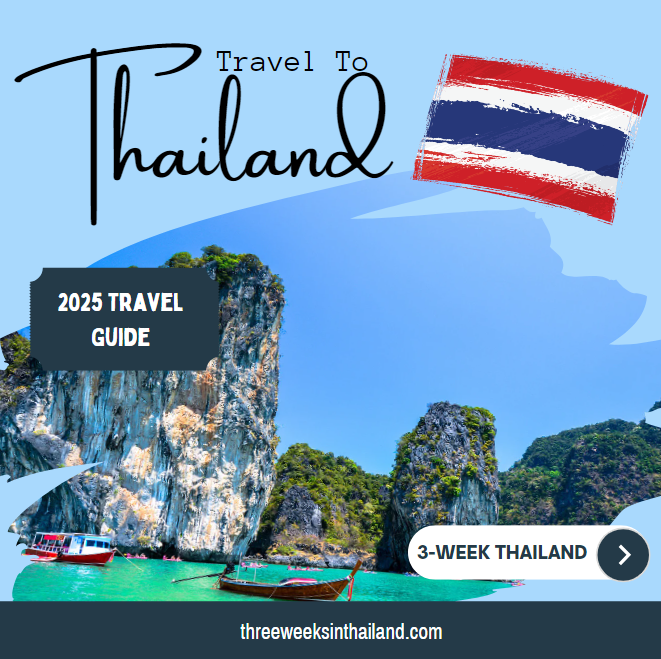Thailand Travel Guide: 10 Essential Questions Answered Before Your Trip
Are you planning your dream vacation to the Land of Smiles? Thailand, with its stunning beaches, vibrant street life, ancient temples, and delicious cuisine, attracts millions of visitors each year. But before you pack your bags, you likely have some important questions. In this comprehensive guide, we’ll answer the 10 most common questions travelers have before visiting Thailand.
1. What Vaccinations or Health Precautions Do I Need Before Traveling to Thailand?
Protecting your health should be a top priority when traveling to Thailand. While the country has good healthcare facilities, particularly in major cities, it’s best to be prepared.
Recommended Vaccinations:
- Routine vaccines: Make sure you’re up-to-date on vaccines like measles-mumps-rubella (MMR), diphtheria-tetanus-pertussis, chickenpox, and your yearly flu shot
- Hepatitis A and B: These are recommended for most travelers
- Typhoid: Especially if you’re staying with locals or exploring rural areas
- Japanese Encephalitis: Consider this if you’re staying for an extended period or visiting rural farming areas
- Malaria: While not necessary for most tourist areas, consult with a travel doctor if you’re heading to border regions
Visit your healthcare provider ideally 4-6 weeks before your trip for personalized advice. Also consider:
- Bringing a basic medical kit with pain relievers, anti-diarrheal medication, and band-aids
- Packing insect repellent (with DEET) and wearing long sleeves in the evenings
- Purchasing comprehensive travel insurance that covers medical emergencies
Pro tip: Always drink bottled water and be cautious with street food if you have a sensitive stomach.
2. Do I Need a Visa to Enter Thailand, and If So, How Do I Apply for One?
Thailand’s visa requirements vary depending on your nationality and planned length of stay.
Visa Exemption Program: Most Western countries (including the USA, UK, Australia, and most European nations) qualify for the Visa Exemption Program, allowing stays of up to 30 days if arriving by air or 15 days if arriving by land. This requires:
- A passport valid for at least 6 months beyond your stay
- Proof of onward travel (return ticket)
- Proof of sufficient funds (10,000 THB per person or 20,000 THB per family)
Tourist Visa Options:
- Single-entry tourist visa: Good for up to 60 days and extendable for an additional 30 days
- Multiple-entry tourist visa: Valid for 6 months with stays of up to 60 days per entry
Apply at your nearest Thai embassy or consulate with:
- Completed visa application form
- Recent passport photo
- Passport with at least 6 months validity
- Proof of travel arrangements
- Proof of accommodation
- Proof of financial means (20,000 THB per person)
Special Entry Requirements: Always check for the latest entry requirements on the Royal Thai Embassy website as regulations can change.
3. What’s the Best Time of Year to Visit Thailand?
Thailand has a tropical climate with three distinct seasons:
Cool Season (November-February):
- Best overall time to visit
- Temperatures: 20-30°C (68-86°F)
- Minimal rainfall
- Perfect beach weather
- Peak tourist season (expect higher prices and crowds)
Hot Season (March-May):
- Temperatures can soar above 40°C (104°F)
- Very humid conditions
- Excellent for budget travelers (lower accommodation rates)
- Songkran (Thai New Year) water festival in April
- Less ideal for extensive sightseeing due to heat
Rainy Season (June-October):
- Daily but typically brief downpours
- Lush, green landscapes
- Fewer tourists and lower prices
- Some island ferries operate on reduced schedules
- September and October see the heaviest rainfall
Regional Variations:
- Gulf islands (Koh Samui, Koh Phangan) have different rainy seasons (September-December)
- Northern Thailand (Chiang Mai, Chiang Rai) is cooler year-round, especially at night
Ideal Time By Region:
- Bangkok & Central Thailand: November-February
- Northern Thailand: October-February
- Gulf Islands: February-April or July-August
- Andaman Coast: November-March
4. How Much Should I Budget Per Day for Thailand?
Thailand caters to all budgets, from backpackers to luxury travelers.
Budget Traveler ($30-50 USD/day):
- Hostel dorm beds: $8-15 USD
- Street food meals: $1-3 USD
- Local transportation: $5-10 USD/day
- Budget activities: $5-15 USD
Mid-range Traveler ($100-150 USD/day):
- Mid-range hotel: $40-80 USD
- Restaurant meals: $5-15 USD
- Taxi/Grab rides: $10-20 USD/day
- Tours and activities: $20-50 USD
Luxury Traveler ($200+ USD/day):
- Luxury hotel or resort: $150-500+ USD
- Fine dining: $30-100+ USD
- Private transportation: $50+ USD/day
- Premium excursions: $100+ USD
Money-saving Tips:
- Eat where locals eat for authentic and affordable food
- Use the efficient public transportation in Bangkok
- Negotiate prices for tuk-tuks, taxis without meters, and at markets
- Book accommodations in advance during high season
- Consider traveling during shoulder seasons for better rates
Additional Expenses:
- Sim card with data: $10-20 USD for 15 days
- Temple entry fees: $3-15 USD each
- Internal flights: $30-80 USD one-way
- Full-day tours: $30-100 USD
5. Which Areas or Cities Should I Prioritize Visiting in Thailand?
With so much to see, planning your Thailand itinerary requires making some choices based on your interests.
Must-Visit Destinations:
Bangkok (2-4 days):
- Grand Palace and Wat Phra Kaew
- Wat Arun (Temple of Dawn)
- Chatuchak Weekend Market
- Vibrant street food scenes
- Modern shopping malls and sky bars
Chiang Mai (3-5 days):
- Ancient temples within the Old City
- Night Bazaar and Sunday Walking Street
- Ethical elephant sanctuaries
- Thai cooking classes
- Doi Suthep temple mountain
Islands and Beaches (5-7 days):
- Phuket: Thailand’s largest island with diverse beaches
- Krabi & Railay: Stunning limestone cliffs and beaches
- Koh Phi Phi: Famous for “The Beach” movie location
- Koh Samui: More developed island with luxury resorts
- Koh Tao: World-class scuba diving and snorkeling
- Koh Lanta: Relaxed atmosphere and beautiful sunsets
Off-the-Beaten-Path Gems:
- Sukhothai: Ancient capital with historical park
- Kanchanaburi: Bridge over River Kwai and natural beauty
- Khao Yai National Park: Wildlife and waterfalls
- Pai: Laid-back mountain town in northern Thailand
- Koh Chang: Less touristy island with pristine beaches
Sample 2-Week Itinerary:
- Bangkok: 3 days
- Chiang Mai: 4 days
- Island destination: 7 days
6. What Are the Local Customs and Etiquette I Should Be Aware of in Thailand?
Understanding and respecting Thai culture will enhance your experience and prevent unintentional offense.
The Wai Greeting: The traditional Thai greeting involves pressing your palms together at chest level and slightly bowing your head. While tourists aren’t expected to initiate the wai, returning one is appreciated.
Royal Family Respect: The Thai royal family is deeply revered. Never make negative comments about the monarchy as it’s not only culturally insensitive but also illegal under Thailand’s strict lèse-majesté laws.
Temple Etiquette:
- Dress modestly (shoulders and knees covered)
- Remove shoes before entering buildings
- Never climb on or touch Buddha images
- Women should never touch or hand items directly to monks
- Keep your head lower than Buddha images when seated
General Cultural Tips:
- Remove shoes when entering someone’s home
- Don’t point with your feet or touch someone’s head
- Public displays of affection are generally frowned upon
- Speak softly and avoid confrontation (keeping cool is valued)
- The concept of “saving face” is important—avoid causing embarrassment
Dress Code: While tourist areas are more relaxed, dressing modestly (especially for women) is appreciated in more conservative or rural areas.
7. How Safe is Thailand for Tourists?
Thailand is generally a safe country for tourists, but like anywhere, it’s important to stay aware of your surroundings and take basic precautions.
Common Safety Concerns:
Scams to Watch For:
- Tuk-tuk drivers claiming attractions are closed and offering alternative tours
- Extremely cheap gem or jewelry deals
- Strangers being overly friendly and offering unsolicited help
- Rental scams involving damaged jet skis or motorbikes
Transportation Safety:
- Motorbike accidents are the leading cause of tourist injuries
- Only rent a motorbike if experienced
- Always wear a helmet
- Use reputable taxi services (Grab is popular)
Areas to Exercise Extra Caution:
- The deep southern provinces (Pattani, Yala, Narathiwat) due to ongoing unrest
- Some border areas with Myanmar and Cambodia
- Crowded tourist areas where pickpocketing may occur
Safety Tips:
- Keep copies of important documents (passport, insurance)
- Use hotel safes for valuables
- Be cautious with alcohol, especially bucket drinks with unknown contents
- Always have travel insurance covering medical emergencies
- Register with your embassy if staying for an extended period
Emergency Numbers:
- Tourist Police: 1155
- General Emergency: 191
- Medical Emergency: 1669
8. What’s the Best Way to Get Around Within Cities and Between Different Parts of Thailand?
Thailand offers diverse transportation options for every budget and preference.
In Bangkok:
- BTS Skytrain and MRT Subway: Fast, affordable, and air-conditioned
- Taxis: Use metered taxis (insist on the meter)
- Grab app: Thailand’s equivalent to Uber
- Tuk-tuks: Fun for short distances but negotiate price beforehand
- River boats and ferries: Great way to avoid traffic
- Motorbike taxis: Quick but only for the adventurous
Between Cities and Regions:
- Domestic flights: Affordable options with airlines like AirAsia, Nok Air, Thai Lion Air
- Trains: Comfortable overnight options between Bangkok and Chiang Mai
- VIP buses: Affordable long-distance travel
- Minivans: Faster than buses but can be cramped
- Ferries and speedboats: For island transportation
Transportation Tips:
- Book transport in advance during high season and holidays
- Consider overnight trains or buses for longer journeys to save on accommodation
- Download the Grab app before arriving
- For peace of mind, book transfers through your accommodation for late-night arrivals
Renting Vehicles:
- International driver’s permit required for car rentals
- Motorbike rentals typically require only a passport copy (but check your insurance coverage)
- Drive on the left side of the road
- Traffic can be chaotic—only rent if you’re confident
9. What Essential Thai Phrases Should I Learn?
While many Thais in tourist areas speak some English, learning a few key phrases will enhance your experience and show respect.
Essential Thai Phrases:
- Hello: Sawadee khrap (male speaker) / Sawadee kha (female speaker)
- Thank you: Khob khun khrap/kha
- Yes/No: Chai/Mai chai
- How much?: Tao rai?
- Too expensive: Paeng pai
- Delicious: Aroi
- Where is…?: … yoo tee nai?
- I don’t understand: Mai khao jai
- Sorry/Excuse me: Khor thot
- Bathroom: Hong nam
Language Tips:
- Thai is a tonal language—the same word can have different meanings based on tone
- Adding “khrap” (male) or “kha” (female) makes any phrase more polite
- Most Thais appreciate any attempt to speak their language
- Download a translation app like Google Translate
- Keep a small phrasebook or use smartphone apps
Thais are generally patient and will try to understand even imperfect attempts at their language.
10. What Electrical Adapters Do I Need for Thailand?
Electrical Information:
- Voltage: 220V (similar to Europe, different from USA/Canada’s 110V)
- Frequency: 50Hz
- Plug types: Primarily Type O (two round pins), but Types A and C also commonly used
What You Need:
- Most modern electronics (phones, laptops, cameras) have built-in voltage converters
- Check your devices: if they say “Input: 100-240V”, you only need a plug adapter
- If your device only works with 110V, you’ll need a voltage converter
Adapter Tips:
- Universal adapters are ideal and widely available
- Power strips from home can save you from needing multiple adapters
- Quality adapters can be purchased in Thailand’s shopping malls if needed
- Consider a surge protector for expensive electronics
- USB charging points are common in newer hotels and cafes
Final Thailand Travel Tips
Before You Go:
- Download useful apps: Grab, Google Maps, Google Translate, XE Currency
- Inform your bank of travel plans to prevent card blocks
- Make digital and physical copies of important documents
- Check if your phone is unlocked for international SIM cards
Upon Arrival:
- Exchange only a small amount of money at the airport (rates are better in the city)
- Purchase a local SIM card for affordable data
- Take official airport taxis or pre-arranged transfers to avoid scams
During Your Stay:
- Stay hydrated and protect yourself from the sun
- Be respectful of local customs and dress codes
- Try authentic Thai food but ease into the spiciness
- Bargain at markets but always with a smile
Thailand’s incredible diversity of experiences, warm hospitality, and ease of travel make it an ideal destination for everyone from first-time travelers to seasoned adventurers. With proper preparation and an open mind, your Thai adventure will surely become one of your most cherished travel memories.
Have you visited Thailand before? What other questions do you have about this amazing destination? Let us know in the comments below!
Disclaimer: This blog post was last updated on February 25, 2025. While we strive to provide the most accurate information, travel requirements and conditions may change. Always check official sources before traveling.


